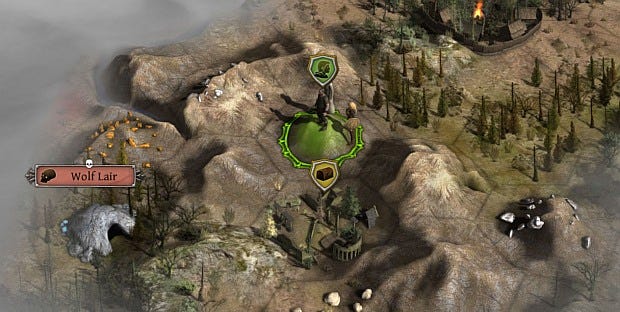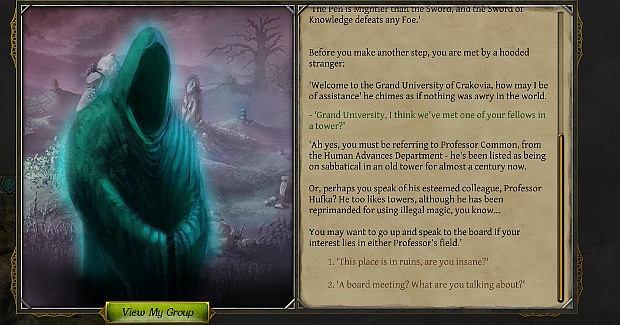Wot I Think - Thea: The Awakening
A survival 4X RPG roguelike with crafting and card combat.
If nothing else, Thea: The Awakening [official site] is different, and different can go a long way.
That also makes it a difficult game to assess. Most games lend themselves to comparison with the best games in their genre, or they are clearly borrowing from other games, and I can look at how one design is in dialogue with another. None of that changes how I feel about a game, but it does help me understand and articulate my reactions.
Thea doesn't work that way. It's a survival 4X RPG roguelike with crafting and card combat. I can recognize all the ingredients, but the game itself is sui generis. I can recognize the ingredients in the dish, but I've never encountered anything quite like it.
That's an exciting, wonderful feeling. Especially because I've started to get a little exhausted with 4X games that take all their cues from Civilization and Master of Orion, where exploration and expansion take on a form as familiar and unchanging as a religious ritual. Where you know what's waiting at the end of the road almost from the moment you take your first steps. With Thea, it took me a while just to figure out whether there was a road at all.
As that excitement and wonder started to fade, however, Thea started to fall apart. I got exhausted by the repetitive structure of each turn, where there was always another minigame to play. The card combat system is the worst offender, but there's also the constant inventory-management and item-swapping between groups, endless worker reassignment as they craft the same handful of items over and over until they run out of recipe ingredients.
Thea, which had seemed like such an expansive new frontier, started to feel like a large collection of small ideas.
At the start of Thea, you learn that the eponymous fantasy world is "awakening" from a long period of magical, apocalyptic darkness. Civilization has been wiped out and you take the role of a weakened deity looking after a tribe of followers who broadly fall into three categories: gatherers, builders, and warriors. Your single settlement is where you will stockpile resources and build better gear for your characters, while expeditions head deeper into the unknown wilderness to find precious resources and unravel the mystery of Thea's collapse.
There's never very much to do with your village. I always had a few people there endlessly crafting items and maybe doing some subsistence farming, but "survival" receded very quickly as a goal, while the focus shifted to making sure my adventuring expeditions were armed and armored with the best gear via a simple crafting system.
Thanks to Thea's event system, which has no shortage of random "screw the player" events, the village turned into a place where, occasionally and for no good reason, something bad would happen that would kill characters or wipe out supplies.
It's on the expeditions that all the real action takes place. Your expeditions battle monsters, negotiate with demons, and visit quest markers to advance the story by various means. Depending on what kind of characters you have in your party, sometimes you can choose to avoid direct confrontation by engaging in battles of wits, words, and subterfuge.
Each type of challenge is resolved with a simple card-combat game. At first, I thought this was delightful. I love deck-building games, and good card combat systems can do a great job of creating a form of randomness that always seems more positive than negative. After all, a bad roll of the dice doesn't leave me with anything to do, but a bad hand always challenges me to make something good come of it.
But Thea's card game starts to get old fast, especially because its dynamics resemble a JRPG more than they do a modern card game. Every character in your party is represented as a card with a bunch of actions on it, so there's not all that much randomness in each draw. Since every character will take part in each round, making weight of numbers a substantial advantage, the card game is more a question of picking actions and an order of operations for your party than of employing clever synergies between cards.
If your party is in a level-appropriate encounter, your special abilities will be effective. If you're overmatched, nothing will work and you'll get stomped. Most encounters in Thea can be auto-resolved or forfeited. Good, close-fought battles were rare, which also meant that the card game achieved its full potential just as rarely.
The reason I started to really dislike Thea, however, is that it convinced me, again and again, that I just needed to put more time into it. Everything would click into place after just a few more hours, a few more quests, a few more levels, a few more research upgrades. Then I'd get swatted-down by a giant pack of monsters that came out of nowhere, or a plague would devastate my settlement, and I'd see hours of work and character development erased. Sometimes, the setbacks were so bad and so close together that there was no coming back from them, and I'd have no choice but to start over.
Except I wasn't learning how the game worked as much as I was learning the location of every single landmine it would place in my path. I learned which choose-your-own-adventure quests were viable for a party of a certain level of experience and gear, and which responses yielded better results. I learned what each group of enemies could do in combat, and how I could counter them. I learned what combinations of resources did in different crafting recipes so I could identify the best ones.
But once I'd learned how to navigate a new hazard, or learned how a question works and when my party would be able to complete it, that part of Thea was effectively dead to me. It was a box to be checked on my way to new parts of the game that I hadn't uncovered yet.
What I learned, more than anything, was that the smart way to play Thea was also the safe and dull way to play. Combat challenges that seemed iffy weren't worth attempting because even a close victory could be ruinous as my heroes succumbed to their wounds after the fight, or if my party was attacked by another strong enemy while it attempted to rest and recover.
Pressing boldly into the unknown sections of the map could lead to starvation or death, but a bunch of incremental excursions was a safe way to level-up characters and acquire better gear. So a lot of the game passed via auto-resolution while I built my party up to take on the next tier of challenges. Once they were done, it was usually time for some new item-building followed by another long round of patrolling the map and farming experience.
Despite the fact that I found most of this pretty dull, Thea is an enormously difficult game to stop playing. Once I overcame my early difficulties with the game and learned how to keep my village and expeditions safe, I was always chasing some new form of progress. I was either marching across the wasteland to a distant silver deposit that would let me craft great weapons and armor, or I was learning what my new Witch-class character could do once she had a few levels under her belt. I enjoyed watching my party become more capable, and absolutely crushing monsters that I'd once struggled to defeat.
Thea can be a charming place to go adventuring, too. It's a world where you'll go play yenta for a dwarf and a some kind of water-spirit that may or may not be abducting children to become fairies. You'll encounter head-in-the-clouds university academics still debating whether it's their fault the world ended, and runaway demons who try and convince you that if they only eat a few humans a year, they should get a free pass.
All of that made it easy for me to get curious about what might happen next, to feel like I was making progress towards some kind of goal that would reward me for the time I'd invested in all the random combat and item crafting. But then I'd realize that while the numbers were getting bigger on all my items and all my enemies, nothing was actually changing or evolving. It was the same game after 20 hours that it was after two.
When I started playing Thea: The Awakening, I was excited for its possibilities. I'd love to play the game that I thought, in those early hours, that I was playing. If the card battle system were better and less predictable, if there was more stuff to do with your village and a greater tension between exploration and protecting your home, if failure weren't quite so punishing or random at times… Thea breaks the mold by doing a lot of different things at once. It just needs to do all of them better.
Thea: The Awakening is out now for Windows via Steam and Humble. There is also a free and unsupported Linux version.











